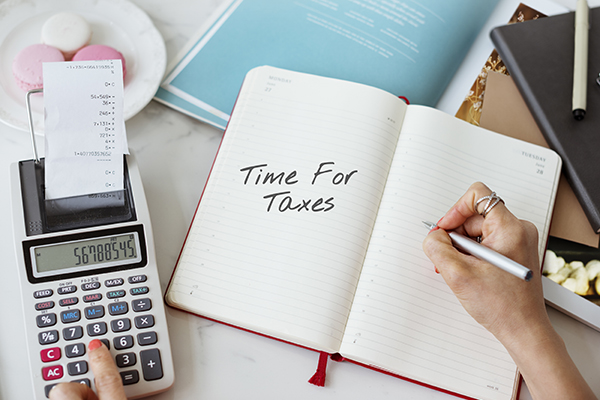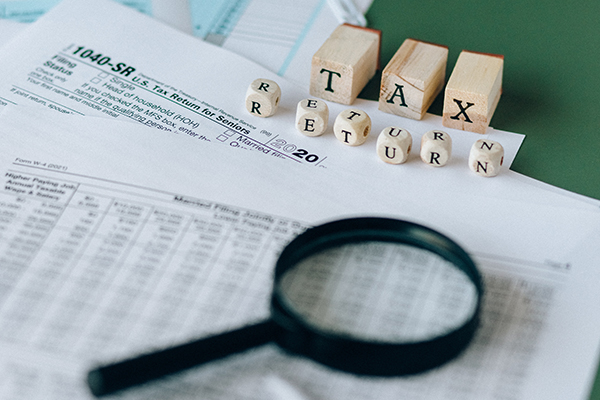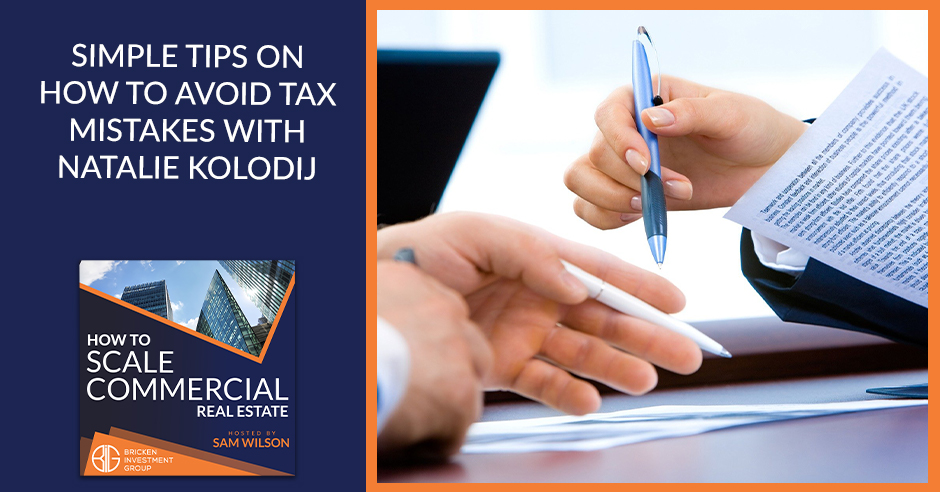Do you want to increase profit? Avoid tax mistakes. Host Sam Wilson welcomes Natalie Kolodij, the CEO of Real Estate Tax Strategist. Natalie shares with Sam how it’s a common mistake for real estate investors to mix up bank accounts. The easiest way to keep track of all of your taxes is to use one bank account for all of your real estate finances. Another common mistake? Not paying attention to carryovers. If you have a rental and can’t use your losses in that year, they roll forward to the next year. Join in the conversation to learn more about avoiding tax mistakes. Tune in and increase your profit!
—
Watch the episode here:
Listen to the podcast here:
Simple Tips On How To Avoid Tax Mistakes With Natalie Kolodij
Natalie Kolodij is a Real Estate Tax Strategist who has owned her firms since 2017. She has invested in mobile homes, short-term rentals since 2014 as the Cofounder of the National Association of Real Estate Tax Strategists, a nonprofit whose purpose is to provide great education, resources and guidance to taxpayers when it comes to real estate taxation, as well as to provide access to certified real estate knowledgeable tax professionals. Natalie, welcome to the show.
Thanks for having me.
The pleasure is mine. I’m excited about this episode but before we jump into the main topic, can you quickly give our audience a background on where you started, where you are now and how you got there?
It was a combination on accident. I graduated with a degree in Tax. I always tell people I started on real estate the worst way you can, which was I paid for the guru weekend seminar. That wasn’t maybe my finest move. It’s what opened the door for me. That’s how I found a bunch of the resources I have and what got me leading down that path.
I had the overlap of the two and I’ve kept in real estate. On the tax side, it ended up very specialized and that’s why I ended up opening my own firm. I work exclusively with real estate investors on the tax side of things. It’s a lot better to be good at one thing, specialized and a jack of all trades. That’s where I’ve landed.
We say the same thing in the real estate side, which is to pick your niche and get rich or the other idea behind that is to go an inch wide and mile deep. I love the specialization of what it is that you’re doing because there are many nuances to it. The thrust of the show, which this will be a little bit different show in the sense that normally it’s very conversational. Normally, we let the conversation go where it is but you’ve got a fascinating eBook that you’re putting together. It’s something along with the titles of the ten most common tax mistakes or maybe you can tell us the title then we can go through that.
It doesn’t have a set title yet. It’s one of those things where I was told to pick a list and let someone who’s knowledgeable on marketing pick the final title. You can find it through me or my website. The whole reason I was putting this together was close to 40% of the returns I get when I’m looking over someone’s prior returns have some a major error on them, especially with real estate where they either need to be amended, there was money missed, something was done blatantly wrong or depreciation was wrong. That’s a huge thing in real estate. It’s something that gets done incorrectly often.
The easiest way to keep track of all of your taxes is to use one bank account for all of your real estate finances.
The purpose of it was to give people a heads up like, “Here’s a checklist of things to look for.” It’s not a teach you tax strategy book. We’re not diving into the nitty-gritty but like look at A, B and C. If one of these doesn’t match up, go to the next step. Asks questions, look at this and that, figure out why it doesn’t. Sometimes there’s a reason. Sometimes your tax person might not know real estate. That’s the purpose of it. I thought I’d share some of those topics with you and give you a little bit of an extra head start.
I love the idea of putting that guide together. I would think our audience would find it valuable. If you can break down those ten items, what are they? How do we avoid them? What are the mistakes you see people doing?
There’s a handful of mistakes. When it comes to real estate taxation, there’s a lot of returns that need to be fixed. It’s often this same handful of things. They get missed for various reasons but I’m starting with the simpler things that aren’t complicated but are an awful lot and easy to spot. The first one is looking at your Schedule E which is where you report rentals you own in your personal name or in a single member LLC. They’ll go on your 1040 on Schedule E.
Things that get missed are the fair rental day reporting. There’s a box on Schedule E where it asks for your fair rental days for the property. This doesn’t do anything tax-wise, unless you also lived in it part time like a vacation home. This is something that I’ve had a lot of lenders tell me they see wrong and something they use. When they’re looking at a return, they look at those fair rental days for how profitable the property was and what portion of the year you owned it.
If your professional tax defaults and a lot do, they’re putting 365 for that number or 0, your lender is going to look at that property and think you owned it all year. It didn’t perform very well and didn’t make very much money. When you only bought it and got it rented, your fair rental days were only 60. You only had it for a couple of months. That’s one of those big things that isn’t hard. It gets overlooked a lot. It won’t change your taxes but your lender might fuss at you because they’ve got to do some extra due diligence to dive into when you got this property. That’s one of the big things that we see a lot of the time.
Another thing that relates to real estate that won’t show up on Schedule E but is an added page to your tax return is look for your elections. You’ll hear people talk about different elections you can make when it comes to taxes that you can elect to have something taxed a certain way or de minimis safe harbor election. There are different elections you can make on your tax return that say you want a certain tax treatment.
The ones that come up the most often with real estate is the small taxpayer safe harbor. What you’re going to want to look for on your return is there will often be a page that’ll say that. It’ll list the tax code for it, which is 1.263(a)-3h. It’ll say that across the top. It’ll explain that this is an election where you’re choosing based on the basis of your asset and expense for the year to write off repairs that are of a certain amount.

Tax Mistakes: When it comes to real estate taxation, there’s a lot of returns you need to fix.
It works well with certain properties if you’re doing only one large repair and there are no other smaller repairs but look for that on your taxes, see if you have it somewhere on that return. It should have its own page. If you don’t have it, ask your tax professional because it could be something that would be helping you tax-wise to utilize.
There’s another one called the de minimis safe harbor. This is what most people think of. This one is 1.263(a)-1(f). This is what you’ll hear people talk about where you can write off anything under $2,500. That is a tax law and you can do that. If you put in new carpet, paint or whatever you put into your property but it’s under that $2,500 mark, you don’t even have to dive further into treating the repairs. If it’s small enough, the IRS will write it off. You have to have that election or you’re technically not correctly following the tax code. You have to tell them you’re planning to do that. You want to make sure that’s on there.
The other big one that gets missed is it’s a grouping election. I don’t have that code on the offhand but if you’re going to claim real estate professional status, which lets you avoid any passive loss limits so you can write off any losses, your rentals generate but it’s based on hours. If you are telling the IRS that you’re a professional based on how much time you spend on all of your rental properties, there’s an election you have to make on your taxes that’s called a grouping election.
It says you’re going to take your 10 buildings, 10 rentals and treat these as 1 business. Otherwise, IRS is going to look at each individual one separately. If you have any kind of real estate on your tax return, you should probably have at least one of these elections. If you go through every page and there’s nothing mentioning an election, open up the conversation because there’s a chance something was missed or they didn’t check the box, which seems small until you’re audited. They’ve disallowed a bunch because you didn’t check the box. Those are the first easy things, not a big impact.
The next thing we see missed a lot are expenses. What happens is when they’re not directly related to real estate or to the property, they don’t always get captured. There’s a lot of expenses that you can take related to your rental activities that a lot of accountants miss or people missing their record keeping.
Probably one of the bigger ones is a home office deduction. You can qualify for that with your rentals, as long as your rentals meet the level of a trader business, which isn’t hard. It’s that you’re continually involved with them with the intent of profit, which is what most of us are doing. You can have a home office.
Your auto expenses are another big one, your mileage. People lose miles like crazy. That’s $0.58 a mile. It adds up real quick. Keep track of that. If your rentals aren’t nearby, I hear that a lot. “I invested in another state.” You probably still go to the post office, the bank, talk to your agent or meet other investors. There’s a good chance that you have some mileage expense.
Use equity and properties to acquire more properties.
Personal expenses that you use for your properties. A portion of your personal cell and internet become deductible, things like that. Any memberships, if you’re paying for ListSource, BiggerPockets or local meetup memberships, don’t miss any of those. It’s a lot of these costs that aren’t directly run through your business bank account all the time or maybe they’re not directly on the property that gets missed. Sit there and think about everything that you’ve spent money on that you wouldn’t know if you weren’t involved with real estate. Make sure you’re capturing all of that.
It’s a simple way to keep track. We’re sitting here as investors. Our primary focus is finding deals and money. When you’re thinking through all the things that have to get done in the course of running a business, this sounds parasitic drag on our brains. Are there more simple ways to tackle that stuff or we have to do what we have to do? Why not have the company buy the car?
If it’s a totally business-use car, you can. If it’s shared use though, if it’s your main car that you’re also using for business, you have to track your mileage either way because you have to allocate it. There are apps like MileIQ that most people use. That’s the easiest to keep track of it. What I tell people is the easiest to try to keep track of all of your stuff is to use one bank account for all of your real estate stuff. Don’t mix it. Try as hard as you can to keep it in one place.
Even if it doesn’t make it onto your spreadsheet because you tax your interest or standard real estate expenses, if it’s in that bank account, you’ll grab it at some point at the end of the year. You’re right. Your number one focus should be finding deals, running your properties. One of the things that I hear from people as soon as they do it is that they should’ve gotten a bookkeeper quicker. We don’t offer bookkeeping. This isn’t my sales pitch but for most people, one good deal a year will offset that cost. That is not a good use of your time.
One of the ways that we get around a lot of this tracking of stuff is to have a dedicated LLC credit card. If I know that this is a company expense, then you know how to delineate between personal and business. Each LLC and its expenses are siloed inside of those accounts. You’re not dealing with going, “I wonder if.”
What I tell people too is find what works for you. People are always asking me, “What’s the best system?” It’s like asking the best diet. Which one will you stick to? Whatever you’ll do every day or you’re willing to work it, that’s the best system.
I’m liking what we’ve known. We know Scheduled E, some elections and expenses people missed. Those sound like some of the lighter end side of what you’re seeing.

Tax Mistakes: If you have any real estate on your tax return, you should have some pages listing you have at least one of the elections.
Your tax person probably isn’t awful. They didn’t think to ask about it. You’re still good. You can probably still come back to them. A big one that we see a lot and I’ll try to keep this as brief as we can but short-term rentals. They are in-between. They’re newer relative to the big picture of investment strategies. A lot of tax professionals don’t know how to treat them correctly.
The first thing to look for is if your short-term rental is on Schedule C, where an ordinary business goes, instead of Schedule E, where rental goes, there’s a good chance it should not be there. There are a few things that happen because of that. One, anything on Schedule E that’s an ordinary business pays self-employment tax, which is a 15.3% tax. It’s the combination of those little taxes that come out of your paycheck, FICA, Medicare, Social Security. Normally, your employer is paying half and you’re paying half. If you’re self-employed and reporting something as such, you pay both halves. It’s an extra 15% tax.
There’s a very rare time that short-term rentals are subject to that. There are three tests it has to meet. The average guests stay, the average amount of time stayed has to be under seven days. You have to materially participate in the property, which means it’s not as syndication. There are seven different rules to qualify for material participation.
The big one is that you have to provide substantial services as well. To the IRS, substantial services are where you’re running your short-term rental more like a hotel. The best way I tell people to think of it is side by side. A normal short-term rental, you’re still doing what you would do for a regular rental. It’s furnished but you’re only cleaning in between tenants. You’re only providing these basic things. You’re not offering business type services, whereas substantial services would be more like a hotel.
If you’re offering daily cleaning, you can have a maid come by and do a turn down every day if you’re offering meals onsite. You see this in Europe sometimes in short-term rentals. All your meals are lumped in with your stay but you don’t see it here much. Very few people have I ever seen where their Airbnb offers enough that it’s being run more like a business and needs to be over there. If you look on your taxes and your tax professional has put your short-term rental on Schedule C, you need to discuss this with them before you ended up paying extra tax.
That is a real big one to check. They default on putting it there because they know it’s different than a normal rental but they’re not sure exactly how. The other part of that’s a little harder to check for but you’ll want to talk about and be mindful of is short-term rentals are this weird hybrid. Some of them can be non-passive by nature, which they still stay on Schedule E. They’re still a rental but there’s a way the laws are worded.
If you meet those two of the three requirements so if you’re materially participating in the property and your average stay is under a week but there are no services, you’re technically non-passive to the IRS, which is good or could be good because with passive properties or normal rentals, if you generate a loss, a lot of the time those losses are limited based on your income levels. There’s a passive loss limit.
If you have a rental and can’t use your losses in that year, they roll forward to the next year.
If you can work your short-term rental into this non-passive category so if your average day is under seven days and you’re who’s managing it especially, ask your accountant about this because a lot don’t make this distinction. If you buy a nice high-end house to run as a short-term rental and you do cost segregation on it, it’s a $700,000 house. If you generate a $40,000 loss that first year, you can potentially deduct it if it’s classified correctly. You want to bring this up. It gets overlooked a lot. People don’t look at the distinction here but it can be a huge savings and strategy point.
This is where we’re getting into the side of the show where little tweaks like that can have an enormous impact on the amount of money you get to keep at your end.
It’s a point to be mindful of because the difference between having an average day of 10 days or 7, you can easily manipulate if you want it to be passive or non-passive. You’ve got a few options to wiggle things around but you’ve got to be thinking about it ahead of time. At the end of the year, if you’re rolling the dice and hoping for less than seven, that’s not the strategy. We don’t want to do that.
We’ve got four so far. What is number five?
Looking at your interest, a big fan of the BRRR strategy, using equity and properties to acquire more properties is you got to do it correctly. What the IRS says is that we are allowed to trace interest, which means that it’s not deductible specifically against what asset secured the loan. You can trace it to where it’s being used and that’s where you can deduct it.
If you normally say your primary home has a bunch of equity in it, that’s not helping you business-wise. If you take a second like a home equity line or a refinance on it, pull out $200,000 and use that to buy two properties outright, normally that interest might not be deductible or your taxes related to it because it’s on your primary. You might be limited. If we are using the proceeds of that loan for acquiring investment properties, we get to deduct the interest of that portion of that new loan against those investment properties.
This gets missed a lot. Make sure you tell your accountant. If you get 1098, one of those mortgage forms at the end of the year and it says it’s for your primary home, they might not think to ask what it was used for because what you’ve used those proceeds of that loan for is what’s going to determine if it’s deductible or not sometimes. You always want to let them know like, “I pulled out $100,000 but I bought a new rental with it. I did this with it.” If you used it to buy a ski boat, it’s probably not deductible unless you run a vacation business. Let them know because it gets missed a lot. There’s a lot of interest not being deducted when it could be.

Tax Mistakes: If you generate a loss with passive properties or normal rentals, those losses are limited based on your income levels.
What’s number six?
Number six is prior year carry overs. If you have a rental and you can’t use your losses in that year, they roll forward to the next year. They don’t disappear. You don’t lose them. My favorite way to explain it to people is if you ever played old-school like Super Nintendo when you were playing Mario, if you already had a raccoon tail but you got one of the mushrooms that stayed in that box at the top of the screen, those are your losses. If you can’t use it, it doesn’t go away. It’s hovering there until you can use it.
Those roll forward and carry forward for the life of the rental. They never go up and evaporate. What happens a lot is when someone goes from using TurboTax or doing it themselves to a professional or if they switch firms, that’s something that’s very often because it’s something that if you’re in the same software, it keeps rolling forward. If you switch software or people at all, it has to be put back in and it gets overlooked a lot.
If you have $50,000 worth of losses built up that you’ll get to deduct one day, you don’t want those to disappear because of a clerical error. Always check your passive loss limitation, passive loss worksheets and make sure they match up to the amount you had available on your last year as your starting point on this year’s worksheet.
Number seven.
Your in-service state. This is something a lot of people get mixed up with. This is less on commercial because you’ve got a bunch of units. Especially on single-family, you’re in service state is when that property is ready and available for rent. It doesn’t have to be rented. It has to be functional at that point. The point where you could take photos or show it to potential tenants or if you were doing a big rental to the point where you get that certificate of occupancy.
It’s that point where it could be rented. The difference on that is that a lot of costs that go into a property before that point get rolled into the overall cost of the purchase price of the property. Once you’re after that point, we have a different set of tax rules and we can write off a lot more because it’s a functioning open business to the IRS. It’s not startup costs.
Even if your rental had net income, discuss it with your tax professional because you could be missing out on a 20% additional drop in your taxable income.
Be mindful and do some good planning on that. If you know that you have to do a handful of repairs, there are some major ones but then you’ve got a couple of grand of normal turnover things like paint or carpet. You can walk someone through and tell them, “These are all going to be white in a week but that’s it.” Those things you could write off if you hold off told a week and list them. Make sure you’re expressing that to your tax professional ahead of time and knowing when it’s in-service because you’ve got some more flexibility tax-wise there.
Number eight.
Depreciation. This is something that we could do a whole show on. It is often incorrect on returns but the big thing to look for is on your Schedule E on that line for depreciation, it’s 15 or 18 but it’s towards the bottom of the expense list. If there’s no amount there, it’s a red flag. Always check that. It sounds like a given but it gets missed fairly often. Make sure there’s at least something for depreciation.
Your return should also have somewhere in it a depreciation schedule or it’ll be called an asset schedule. It’s almost always a horizontal sheet instead of vertical. You should be able to spot it. Not all tax firms included by default ask for it. You want to make sure they’re using the correct amounts. Something that should be easy to spot is if you eyeball it and look at the amount and they listed. If it is the amount and you get to depreciate as equal to the total you paid for the property, you know that they didn’t back out land value. You’re not allowed to depreciate land.
You always want to look at that report. Even if you’re not a tax professional, the amount should be less than what you paid for what you’re getting to depreciate. It should say an appreciable amount, a land amount, the date and service. These are the things that we talked about and you always want to double check those because if they’re wrong to begin with, they stay wrong for the life of the property until you fix it. It’s one of those things.
We’ve got two left here.

Tax Mistakes: Check how your income is being classified to make sure the accountant is not expensing everything as you go.
The other one is your QBI Deduction. This came out a couple of years ago. This is called the QBI or 199A and this is a 20% write-off on any business income on anything that wasn’t in a C corp. A lot of tax professionals struggled to realize that most rentals qualify as a business. A lot of people missed out on this write off.
If at the end of the day, after all your expenses, that number is positive at the bottom and there is no amount listed on your actual 1040 on the first page or two for a QBI deduction, your tax professional isn’t treating your rental like a business. Look for that amount and line, the QBI Deduction. It stands for Qualified Business Income Deduction. If you don’t see an amount there, even if your rental had net income, not a net loss, discuss it with your tax professional. You could be missing out on a 20% additional drop in your taxable income.
We’re at nine, so one more.
The last thing that we’ll grab off the list here would be flipping income. If you get into flipping properties, we’re going in a different direction but good ending point. Most of your costs and expenses carry to the year when you sell the property. They’re treated as inventory. You don’t get to write off things as you go. It would mismatch things.
You’d end up writing off $40,000 year one as you’re fixing up a house and then year two, you’d have this huge income amount. If you tell your accountant you have a flip but you bought it this year and put work into it, you didn’t sell until February of next year, there shouldn’t be a huge loss on your taxes this year. Be mindful of that.
The other thing is that flips are typically a business income if your intent is to go in, buy houses and resell them. Your accountant by default, is treating them as capital gain, which it can sometimes be. That’s for selling an investment, so it’s a one-off. If you’re doing ten a year and they’re doing that, you’re a little audit red flag running around. Those are the two things to check for on that. Check how your income is being classified and make sure they’re not expensing everything as you go and treating it as inventory.
Natalie, you’ve done a fantastic job of giving us some actionable things to think about when it comes to taxes, planning for the year and thinking ahead. To be honest, there are few things on here where I’m like, “It’s probably something I never thought about. I have to go back and look at a couple of things on my own.” I’ll be honest. For the average individual, myself being below average individual, this is a confusing topic. Every year, I get 150 pages. They hand me a stack of them and say, “Here it is. We’re all done.”
I go, “Sweet glory. I hope this is right.” I’ve asked that question before, “Is this right? I don’t even know where half of these numbers came from. I’ve got my books. I understand those.” Once it gets finally down to that tax return, it’s a mystery to me. We’re being asked to sign off on it as if we certified as true. I was like, “I don’t know.” Don’t get me started on tax law. Regardless if these are the rules of the game that we play. Understanding it is important. Thank you for putting this together. Before we sign off here, can you tell us, what is the best way for our audience to get in touch with you?
The website for my tax firm is Kolotax.com. That’s the easiest way to get ahold of me. My email is Natalie@Kolotax.com. For the book, that’ll also be on the nonprofit website and that’s NARETS.org for National Association of Real Estate Tax Strategists. You’ll be able to see that on there. That also has a bunch of checklists, especially related to this. It’s a checklist of look over your return before you sign it and look at this line. We hand you the return and once you sign off, you’re saying that you agree with it. Most people don’t know what they’re agreeing with until they’re told what to look at.
The stuff that the rest of us need is, “Go here. Look at this. Does this match?” That’s super helpful. Thank you again for putting these resources together and making them available to us. I do appreciate your time and thank you much for coming on the show.
Thanks for having me.
Important Links:
- National Association of Real Estate Tax Strategists
- ListSource
- BiggerPockets
- MileIQ
- TurboTax
- Kolotax.com
- Natalie@Kolotax.com
- Facebook.com/Kolotax
- @Kolodij_Tax_Boss – Instagram
- Real Estate Tax Strategist – YouTube
About Natalie Kolodij
 Natalie is a Real Estate Tax Strategist who has owned her own firm since 2017. She has invested in mobile homes and short-term rentals since 2014. She is the co-founder of the National Association of Real Estate Tax Strategists, a non for profit whose purpose is to provide great education, resources, and guidance to taxpayers when it comes to real estate taxation; as well as provide access to certified, real estate knowledgeable tax professionals.
Natalie is a Real Estate Tax Strategist who has owned her own firm since 2017. She has invested in mobile homes and short-term rentals since 2014. She is the co-founder of the National Association of Real Estate Tax Strategists, a non for profit whose purpose is to provide great education, resources, and guidance to taxpayers when it comes to real estate taxation; as well as provide access to certified, real estate knowledgeable tax professionals.
When not in the office she likes to do pottery, take cruises, and travel the world. Her overall focus for both herself, and her clients, is creating systems to allow for a life of financial freedom. No one needs to live their entire life in a cubicle.




0 Comments